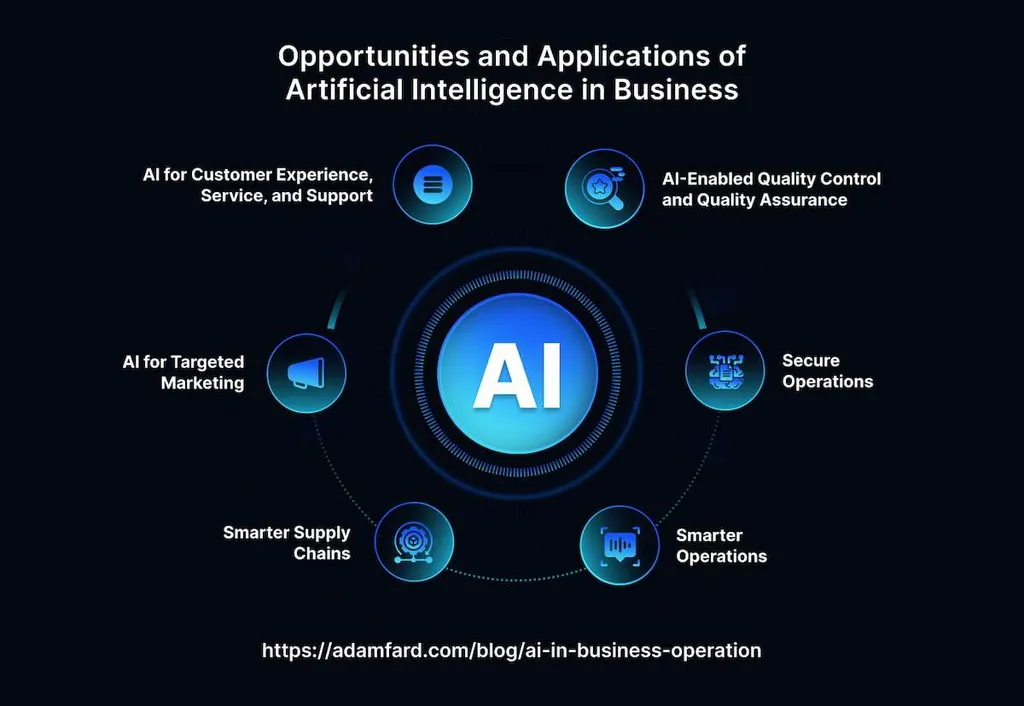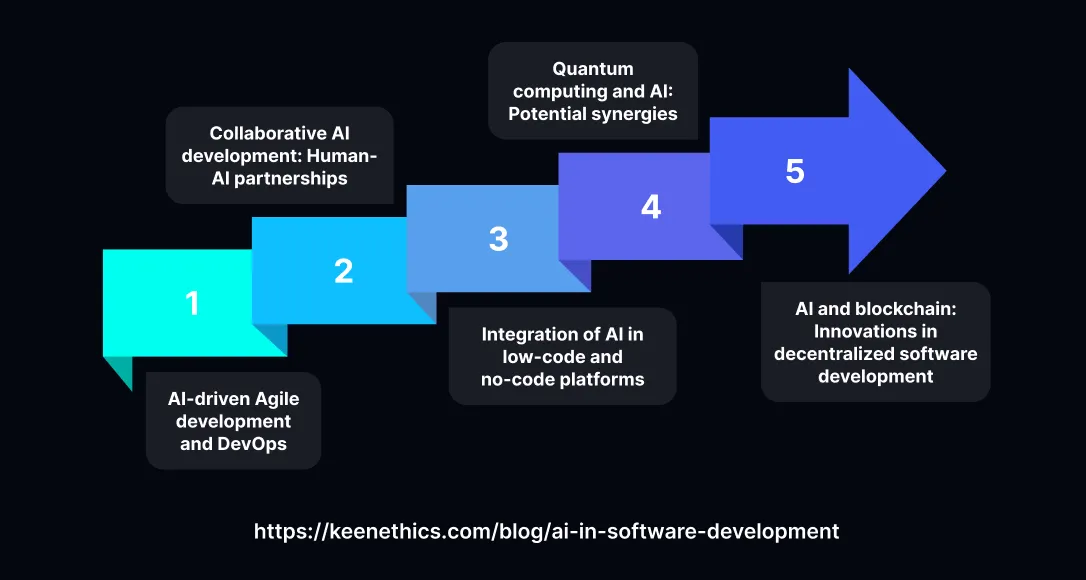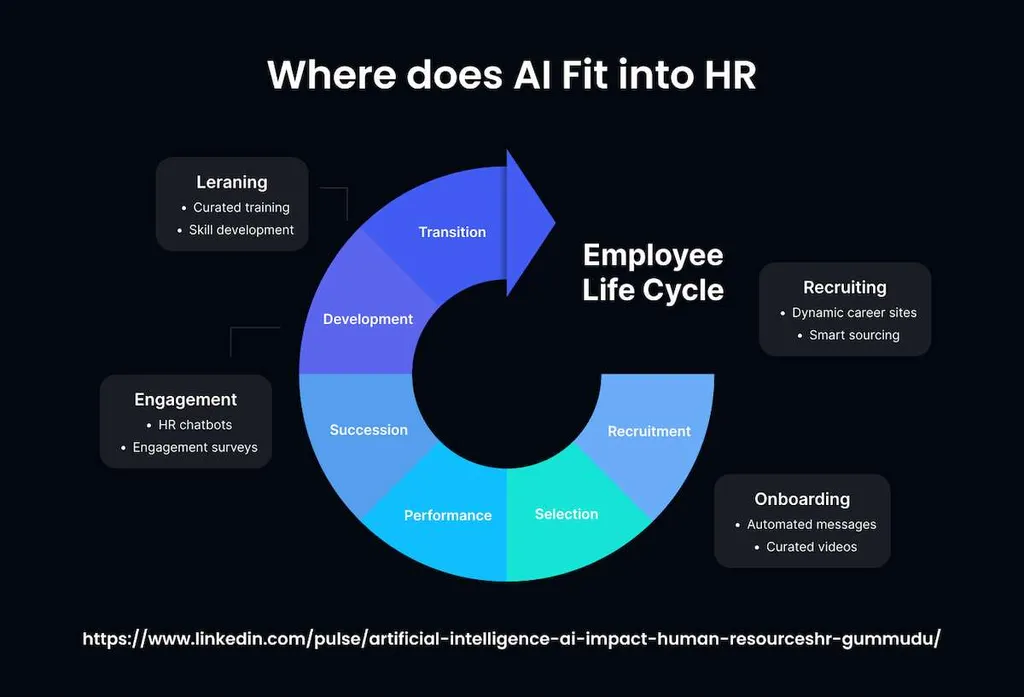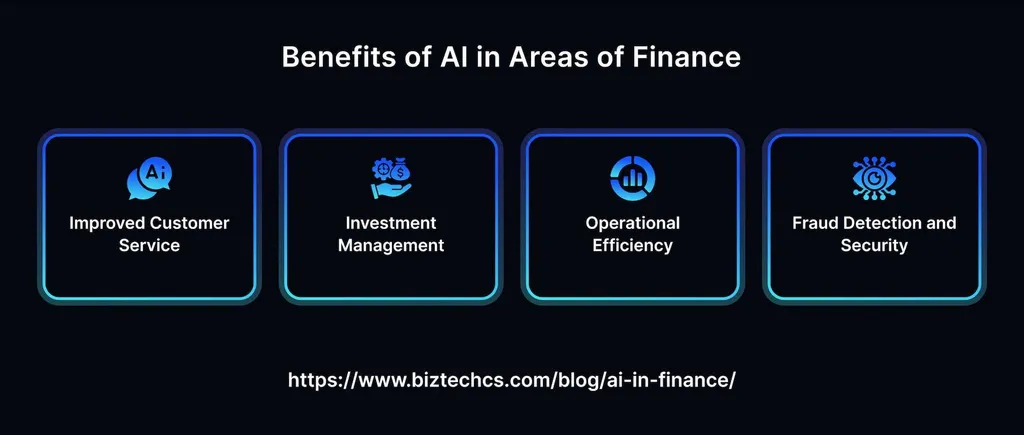The development of artificial intelligence (AI) technology led to the proliferation of solutions based on Large Language Models (LLMs). Their deployment helps companies streamline operations. By automating tasks, firms minimize resource usage. In this guide, we will consider the importance of AI operational efficiency practices for achieving sustainability. After analyzing how AI transforms key industries, we will explore its implications and demonstrate how it can be used by businesses interested in improving their performance. We will provide detailed guidelines for firms that want to integrate AI solutions to increase their profits.
What is AI Operational Efficiency?

The term describes the deployment of AI and machine learning (ML) technologies in different spheres to increase productivity, minimize expenses, and enhance client experience (CX). Establishing a strong market presence requires solving routine tasks quickly. Companies utilize AI to process large volumes of data, collect feedback, provide recommendations, and manage client queries without expanding the staff.
The global AI market is expected to grow by 36.6% annually in the coming years. The quick adoption of this technology is explained by the fact that it allows businesses to build data-driven strategies and use predictive analytics to process historical data and forecast future developments.
By using AI in operations management, companies address problems, reduce downtime, and implement efficient resource allocation practices. However, building custom LLMs from scratch can be daunting, expensive, and time-consuming. Finding a reliable service provider enables businesses to integrate complex AI models without wasting a lot of resources. MetaDialog develops powerful AI systems that allow enterprises to improve the productivity of their CS teams by 5 times.
AI automation frees up staff members, reduces the risk of human errors, and empowers enterprises to enhance their operations. As the current business environment constantly evolves, AI helps companies get an edge over their competitors and overcome challenges.
Benefits of Using AI to Increase Operational Efficiency Across Industries
The deployment of AI systems lets businesses build programs faster, streamline financial reporting, hire the best talents, and make processes less convoluted. Companies utilize artificial intelligence automation systems to shorten the time to market, simplify development cycles, access virtual assistants, use auto-completion tools, conduct monitoring, fix performance issues, and perform other tasks. Let’s consider the key advantages of using AI to boost operational efficiency.
Software Development

Integrating AI tools enables teams to simplify complex processes and meet tight deadlines. AI models can be trained to function as coding partners. They analyze code and predict how it can be completed. Programmers perform tasks faster using AI tools that generate suggestions, add suitable variable names, and fix mistakes. Such systems allow developers to spend less time on repetitive tasks and fully dedicate themselves to solving complex issues and developing architecture.
Automated review tools facilitate writing mistake-free code and eliminating potential issues. AI programs remove common bugs, improve style, and foster security. AI-driven bug detection features facilitate analyzing patterns and using historical data to fix mistakes. Here are the main upsides to implementing AI models:
- High development speed;
- Professional code quality;
- Reduced workload;
- Code consistency;
- Quick bug detection;
- Shorter debugging sessions.
Based on generative AI technology, LLMs have an advanced ability to learn. They improve their performance and enhance operational efficiency over time.
Human Resources (HR)

Hiring new staff is a resource-consuming endeavor. Firms seek to minimize expenses by improving their retention rate. Using AI automation solutions, HR managers analyze data to discover how to enhance the experience of staff members.
AI services are best suited for teams that want to speed up the recruitment process, as they streamline sourcing and selection stages. HR teams utilize AI in operations management processes to perform such tasks:
- Resume screening: Instead of manually sorting thousands of resumes, enterprises deploy AI to scan them based on skills, experience level, and educational background. It allows them to automatically select the candidates that meet the criteria.
- Efficient hiring: By analyzing past data, firms predict which new hires are likely to become long-term employees. These insights allow them to choose the most suitable candidates based on their skills and performance.
- Engaging interactions: As answering questions about the venture and job responsibilities takes a lot of time, firms deploy chatbots to provide relevant replies 24/7. MetaDialog builds AI systems that reduce the average resolution time to 20 seconds. Besides, the company utilizes advanced LLMs to increase the response speed by 2 times.
- Interview scheduling: Businesses use AI to choose suitable slots and schedule meetings.
- Improved onboarding: Helping new hires involves using AI-based platforms with answers to general questions and information about policies.
AI lets HR professionals analyze sentiment, detect issues, and adjust strategies to improve employee satisfaction.
Internal Processes
The usage of AI in operations management empowers businesses to transform routine practices. They automate workflows by streamlining data entry, generating mistake-free reports, and solving repetitive tasks without human intervention. It allows employees to focus on more creative operations:
- Developing result-yielding strategies: The in-depth analysis of operational data allows companies to identify the areas requiring optimization.
- Solving issues: When processes get automated, team members dedicate more time to complex issues and find the best way to streamline their operations. They provide personalized assistance and strengthen relationships with customers by increasing their satisfaction levels.
- Optimizing maintenance: AI models analyze data collected by sensors and predict when tools may require maintenance to continue functioning without any issues. AI algorithms detect anomalies and notify staff members about potential threats. Such systems send alerts when dangerous issues occur. Enterprises implement AI preventive maintenance practices to increase equipment lifespan.
- Resource allocation: By reducing downtime, firms optimize the way they use the available resources.
Ventures utilize AI to streamline processes, implement efficient safety practices, prevent failures, create a secure environment for all employees, and achieve operational excellence.
Financial Sector

Maintaining compliance requires companies to keep their documentation in order and avoid mistakes associated with manual input. AI systems recognize suspicious activities and protect firms from fraudsters. Here are the main advantages of using AI in finances:
- Invoice generation and processing: Digitization and AI automation allow businesses to create invoices using the information extracted by OCR software. AI-driven tools automatically add vendor names, amounts, and due dates.
- Categorization: AI tools sort invoices and add them into relevant categories based on their type. It expedites the approval process and helps ventures avoid delays.
- AI matching: Smart tools automatically match invoices with corresponding purchase orders. They allow companies to spend less time on verification procedures.
- Short processing time: The integration of AI systems with legacy software enables businesses to pay invoices without delays and achieve a consistent cash flow.
AI services enable businesses to counter the threat of financial fraud, monitor transactions, and identify suspicious behaviors. In addition, LLM deployment allows firms to streamline KYC procedures and follow AML policies. It results in improved compliance, enhanced asset safety, and lower expenses.
How to Utilize AI to Achieve Operational Efficiency
Recognizing the necessity to streamline convoluted processes, ventures deploy AI to improve customer support quality, expand client bases, and establish a strong market presence. Here are the main ways to use AI to optimize internal processes and achieve strategic goals:
- Personalized recommendations: Popular video streaming platforms and e-commerce services have already implemented AI-powered mechanisms to study user preferences and devise tailored offerings. AI algorithms analyze a browsing history to make relevant suggestions. AI operational efficiency strategies allow enterprises to improve user experience, achieve higher engagement, and boost profits. Digital assistants use Natural Language Processing (NLP) technology to provide context-relevant interpretations. They answer user queries, set reminders, send notifications, and perform basic tasks.
- Self-driving vehicles: The automotive giants develop powerful cars equipped with AI-powered navigation and object detection systems. It accounts for higher safety and helps companies increase the efficiency of their cars.
- Improvements in the healthcare sector: The usage of AI expedites diagnostics and makes healthcare services more accessible. Professionals deploy such tools to analyze patient records and discover the most efficient treatment strategies. Machine learning allows specialists to analyze images and detect the early signs of life-threatening conditions.
- Financial services: Banks and other organizations deploy AI to minimize the occurrence of fraud and offer personalized advice. Besides, AI systems are used in algorithmic trading, enabling traders to boost their profits by capitalizing on changing prices.
- AI-powered agriculture solutions: By deploying AI models, firms achieve better crop yields, perform efficient monitoring, and optimize resource usage. Companies utilize drones with smart cameras to identify possible issues and collect data to improve planting and harvesting practices.
- Manufacturing: The usage of robots helps ventures increase production capacity, reduce marriage, and automate routine tasks. Collaborative robots assist humans, allowing them to expedite their assembly line and packaging workflows.
In addition, AI models stand out for their impressive cyber security threat detection mechanisms. They analyze traffic and browsing habits, discover possible issues, and take the necessary steps to safeguard user data.
Future Trends in the Usage of AI for Enhancing Operational Efficiency
With technological advancements, more companies are expected to adopt AI operational efficiency solutions and use them to transform their processes. Below, we have outlined some developments that can change the way AI is used across industries:
- Explainable AI (XAI): As most clients are interested in accountability and transparency, it becomes crucial to demonstrate how AI models function. This approach lets businesses achieve full compliance.
- Improved sustainability: AI tools enable businesses to avoid wasting valuable resources and reduce their environmental footprint. They increase energy efficiency and implement nature-friendly practices, which allows them to strengthen their relationships with clientele.
- Continuous development: AI models have advanced self-learning capabilities. They improve their performance and solve complex issues without human intervention.
Companies will be able to access more complex AI-powered systems and fully transform their processes.
Best Practices for Integrating AI in Operational Processes
When deploying AI solutions, a firm should embrace an innovative approach to optimize its routines and expedite workflows. Let’s consider the most result-yielding strategies adopted by ventures that want to leverage the power of AI:
- Set achievable goals: A firm should consider why it wants to utilize AI. Its objectives may include cost reduction, improved customer satisfaction, or enhanced efficiency.
- Analyze current processes: Identifying areas for improvement helps a business owner to understand which tasks require automation. For instance, the AI-powered systems developed by MetaDialog help enterprises automate up to 81% of the responses provided by the CS team.
- Use high-quality datasets: By collecting relevant data and ensuring its accessibility, companies maintain compliance.
- Learn more about new technologies: Choosing the right automation method allows ventures to scale up their operations and cope with tasks of different complexity.
- Focus on explainability: Stakeholders should understand how AI tools come to specific conclusions. Knowing how such systems function fosters trust and expedites adoption.
- Eliminate biases: When implementing AI software, it’s essential to integrate mechanisms protecting user privacy and ensuring fairness.
- Improve LLM’s performance based on feedback: By enhancing the quality of collected data, ventures refine AI models and increase the efficiency of their processes.
Besides, companies should ensure that an AI model seamlessly integrates with legacy systems. It’s essential to monitor AI tools’ performance and analyze the key metrics. By building a culture of AI operational efficiency, ventures encourage staff members to utilize this technology to optimize processes. Integrating advanced security measures allows companies to protect data by using encryption, configuring access rights, and conducting regular audits. These practices enable firms to streamline their procedures using AI.
Summing Up
The deployment of modern AI operational efficiency practices allows ventures across many industries to optimize their routine tasks and streamline workflows. The power of automation will enable companies to release products, serve clients, and collect feedback faster, without spending a lot of tangible and intangible resources. However, finding a reliable provider capable of integrating advanced AI systems is challenging unless a firm sets its priorities straight. MetaDialog has a team of experts who deploy LLM-based solutions to achieve excellent productivity. They help clients reduce costs, avoid errors, build stronger relationships with clientele, and get a competitive advantage. Get in touch with our professionals now and discover how to embrace AI to adapt to the ever-changing business environment.
